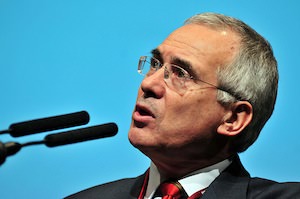Economist Stern: ‘I Got It Wrong on Climate Change — It’s Far, Far Worse’
Lord Nicholas Stern, the widely respected author of a landmark 2006 government-commissioned report on global warming’s effect on the world economy, says he underestimated the risks and should have been more “blunt” about the dangers posed by rising temperatures.
Lord Nicholas Stern, the widely respected author of a landmark 2006 government-commissioned report on global warming’s effect on the world economy, says he should have been more “blunt” about the dangers posed by rising temperatures.
In an interview at the World Economic Forum in Davos, Switzerland, Stern said: “Looking back, I underestimated the risks. The planet and the atmosphere seem to be absorbing less carbon than we expected, and emissions are rising pretty strongly. Some of the effects are coming through more quickly than we thought then.”
The 2006 review predicted a 75 percent chance that global temperatures would rise 2 to 3 degrees above the long term average. Now Stern says the planet is “on track for something like four.” Other major studies have shown a 6-degree rise is probable.
“I think I would have been a bit more blunt,” he said. “I would have been much more strong about the risks of a four- or five-degree rise.”
As Stern regretted his underestimation, Jim Yong Kim, the new president of the World Bank, warned others present at the Davos conference of “water and food fights everywhere” if the forecast of a 4-degree increase proves accurate.
Kim asserted the need for a carbon market in which businesses pay to pollute and are compensated to reduce their greenhouse gas emissions. Confidence in those schemes took a well-deserved hit last week, however, as the price of carbon in Europe dropped to an all-time low. The Climate News Network reported Sunday that “It is now cheaper [for European companies] to pollute the atmosphere than to invest in becoming energy-efficient.”
This outcome was expected. The scheme, known as ETS, now in its eighth year, was not controlled by laws that prevented industry from weakening it through lobbying. Corporations complained that emission caps and high carbon prices would limit their ability to compete in the world market, and politicians caved. The market became flush with unsold credits, and prices plunged from a record $40 a tonne in the summer of 2008 to less than $4 on Thursday. “[I]t is hard to see how the price could recover,” Climate News Network reported.
Such a complete failure of markets to serve as reliable engines in the effort to combat global warming leaves little reason to continue depending on them. Politicians, who have more resources to inform themselves than almost any other group, should know this better than anyone else.
“The ETS is not fit for purpose,” Joanna Cabello from Carbon Trade Watch said in Climate News Network’s story. “It has generated windfall profits for polluting corporations, postponed the needed transition away from fossil fuels, and its unintended consequences are locking the EU into another generation of energy production based on fossil fuels. These structural flaws remain unaddressed by the [European] Commission.
“Instead of taking their responsibility, politicians have voluntarily put their main instrument to fight climate change in the hands of the financial markets. As we know, market mechanisms have their own dynamic. Profit-making and not fighting climate change has become the overriding objective of the players involved in carbon trading.”
— Posted by Alexander Reed Kelly.
Your support matters…Independent journalism is under threat and overshadowed by heavily funded mainstream media.
You can help level the playing field. Become a member.
Your tax-deductible contribution keeps us digging beneath the headlines to give you thought-provoking, investigative reporting and analysis that unearths what's really happening- without compromise.
Give today to support our courageous, independent journalists.






You need to be a supporter to comment.
There are currently no responses to this article.
Be the first to respond.